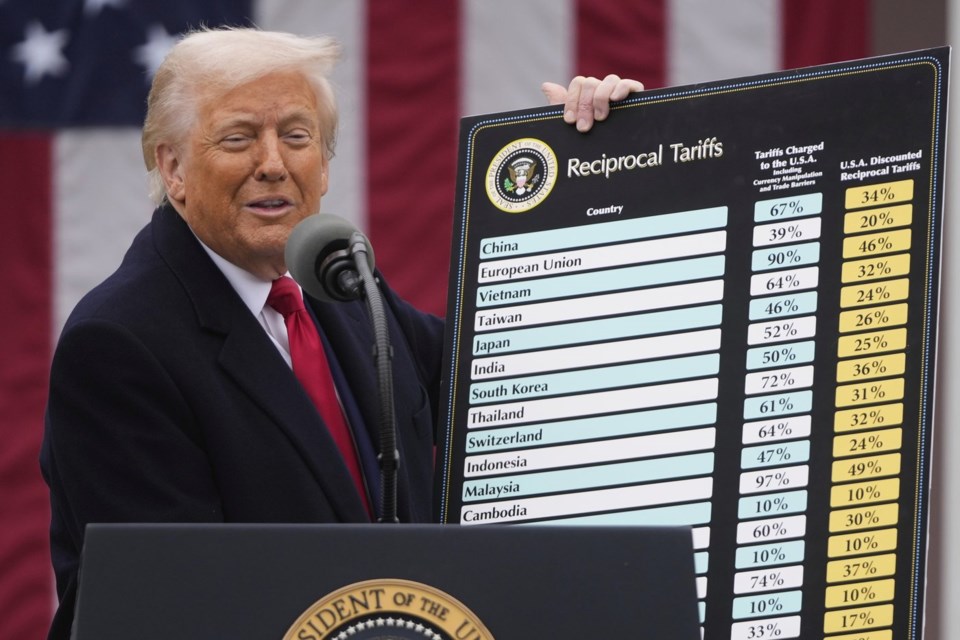WASHINGTON (AP) — President Donald Trump likes to boast about how much money the U.S. Treasury is raking in from the massive taxes – tariffs -- he’s slapped this year on imports from almost every country in the world.
“We have trillions of dollars coming into our country,” Trump said Wednesday. “If we didn’t have tariffs, we would be a very poor nation and we would be taken advantage of by every other nation in the world, friend and foe.”
But two courts have now ruled that his biggest and boldest import taxes are illegal. If the Supreme Court agrees and strikes them down for good, the federal government could have to pay back many of the taxes it’s already collected from companies that import foreign products into the United States.
“We’re talking about hundreds of billions of dollars potentially in refunds affecting thousands and thousands of importers,” said trade lawyer Luis Arandia, a partner with the law firm of Barnes & Thornburg. “Unwinding all that will be the largest administrative effort in U.S. government history.’’
Ordinary Americans, who've had to pay higher prices on some products because of the tariffs, are unlikely to share in the windfall. Any refunds would go instead to the companies that paid the levies in the first place.
The refunds would also reverse the flow of tariff revenue the president has counted on to help pay for the massive tax-cut bill he signed July 4 and would threaten, he warns, to “literally destroy the United States of America.’’
At issue are revenues raised from tariffs Trump imposed this year by invoking the 1977 International Emergency Economic Powers Act (IEEPA). One set of IEEPA tariffs targeted almost every country on earth after he declared that the United States’ massive and persistent trade deficits amounted to a national emergency. Another was aimed at Canada, China and Mexico and was meant to counter the illegal flow of drugs and immigrants across U.S. borders.
But a specialized federal trade court in New York ruled in May that the president overstepped his authority by ignoring Congress and imposing the IEEPA tariffs. The U.S. Court of Appeals for the Federal Circuit last week largely upheld the trade court’s decision, though it also ordered the lower court to re-consider whether there was any legal fix short of striking down the tariffs completely.
The appellate judges also paused their own ruling until mid-October to give the administration time to appeal to the Supreme Court – something that it did on Wednesday. Solicitor General D. John Sauer asked the justices to take up the case and hear arguments in early November.
If the high court strikes down the IEEPA tariffs, importers could be entitled to refunds. The U.S. Customs and Border Protection agency reports that it had collected more than $72 billion in IEEPA tariffs through Aug. 24.
For importers, Ted Murphy, co-leader of the international trade practice at the Sidley Austin law firm, said: “It’s a question of what you’re going to have to do to get the refund.
“And the options are everything from nothing — the government may just automatically refund it; I don’t think this is likely, but that’s one option. There could be an administrative process, so you have to go to U.S. Customs and Border Protection and apply for a refund of your IEEPA tariffs. Or you could have to file your own court case.’’
There’s a precedent for courts setting up a system to give companies their money back in trade cases. In the 1990s, the courts struck down as unconstitutional a harbor maintenance fee on exports and set up a system for exporters to apply to get their money back.
“Companies got refunds,’’ Murphy said. One hitch: In that case, the government did not have to pay interest on the tax it collected and had to pay back. It’s unclear whether the government would have to pay interest on any IEEPA tariff refunds.
The Trump administration might balk at paying back the tariffs it’s collected. Trump has already said he doesn’t want to pay the money back, posting on his social media site in August that doing so “would be 1929 all over again, a GREAT DEPRESSION!”
“I would anticipate that if the administration did lose, they would turn around and start arguing why it would be impossible to give refunds to everybody,” said Brent Skorup, legal fellow at the libertarian Cato Institute. “I think there will a lot of litigation about the nature of refunds and who’s entitled one. And I expect the administration will raise all sorts of objections.''
To make sure they can successfully claim refunds, said Barnes & Thornburg partner Clinton Yu, “importers really need to have their records in order.’’
Adding to the uncertainty is the chaotic way that Trump has rolled out his tariffs — announcing and then delaying or altering them, sometimes conjuring up new ones. Occasionally, the administration has decided that importers that have already paid one of his tariffs don’t have to pay a different one.
Tariff are paid by importers, who often then try to pass the cost on to their customers through higher prices. But consumers would not have recourse to ask for refunds for the higher prices they had to pay.
“It’s the importer of record that is legally liable for paying tariffs and duties,’’ Arandia said. “They would be the only one to have standing to even get that money back.’’
____
AP Writers Lindsay Whitehurst and Josh Boak contributed to this story.
Paul Wiseman, The Associated Press



